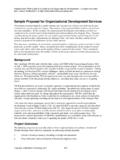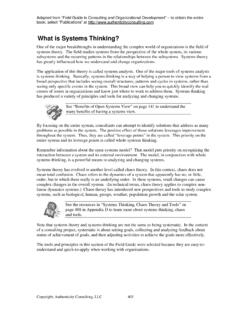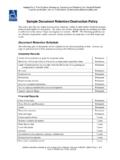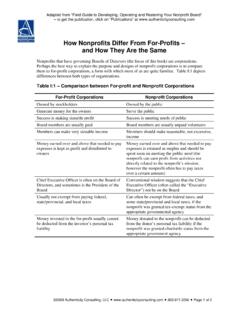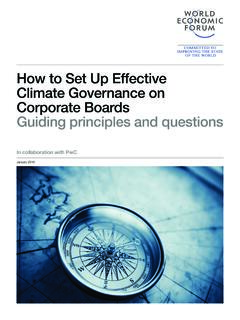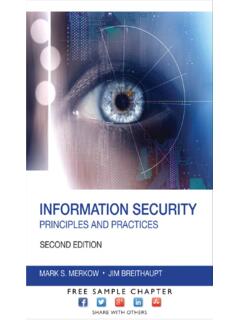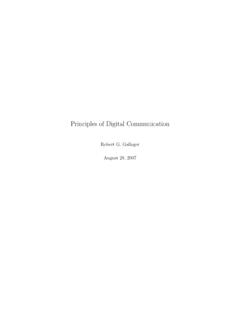Transcription of Principles of Ethical Consulting
1 Adapted from Field Guide to Consulting and Organizational Development to obtain the entire book, select Publications at Copyright, Authenticity Consulting , LLC 32 Principles for Ethical Consulting Simply put, ethics involves learning what is right or wrong, and then doing the right thing however, in organizational Consulting , the right thing is not always easy to identify. Ethics includes the fundamental ground rules by which we live our lives. Values that guide how we ought to behave are considered moral values, for example, values such as respect, honesty, fairness and responsibility. Statements around how these values are applied are sometimes called moral or Ethical Principles . Ethical consultants must have a set of Principles , which defines Ethical behavior and guides the consultants actions toward those behaviors. This is true whether you are an external consultant or an internal leader wanting to lead employees fairly and equally.
2 Many times, those Principles are documented as a code of ethics. Also, consultants must be able to recognize Ethical dilemmas and have at least one tool to use to address the dilemma. Information in this subsection will help you to develop your Principles for Ethical Consulting , recognize Ethical dilemmas and resolve those dilemmas, as well. Codes of Ethics to Avoid Behaviors That You Perceive as Unethical It is critical that you establish some major Principles , or guideposts, to ensure that you consult in a manner that is fair and equitable and also that minimizes your liabilities as a consultant. Those Principles are your inner compass in the midst of the confusion and complexity that are typical at various times in an organizational change effort. Many times, consultants start developing that compass by developing descriptions of their mission and vision for their Consulting work and the way that they want to work.
3 See How to Articulate Your Professional Mission and Values on page 57 for guidelines to articulate your professional mission and values. Consultants might refine description of their preferred values and behaviors by developing a code of ethics or conduct of conduct. Here are some important Ethical guidelines for Consulting during organizational change. 1. Do no harm to your client. 2. Keep client information private unless the client or law requests otherwise. 3. Do not create dependence by you on your client, nor by your client on you. 4. Anticipate and avoid conflicts of interest (for example, representing two opposing interests at once). 5. Do not act in the official capacity as an advocate for your client. 6. Do not go beyond your own expertise. 7. Do not skip the discovery phase of Consulting . Adapted from Field Guide to Consulting and Organizational Development to obtain the entire book, select Publications at Copyright; Authenticity Consulting , LLC 33 8.
4 Treat others the way you want them to treat you. One of the hallmarks of established professions are codes of ethics for those professions. Here are two relevant examples of codes of ethics that you might reference. American Society for Training and Development at Organization Development Institute at Avoiding Behaviors That Clients Perceive as Unethical To avoid unethical behaviors, you also should develop strong self-awareness, including about your own biases and assumptions and about the limits of your own expertise. This self-understanding is critically important. See Understanding Yourself as an Instrument of Change on page 45 for many guidelines to help you to develop deep awareness of your nature and skills in Consulting . When first establishing a relationship with your client s organization, you should make every effort to learn the culture, or personality, of their organization.
5 The culture is reflected in a variety of values, some of them actually enacted and others that are preferred by members of the organization. Ethical behaviors should conform to the values of that culture, as well as your own professional values. See How to Work in Multicultural Environments on page 61 for guidelines to learn the most important values in the culture of your client s organization. Examples of a Consultant s Unethical Behaviors To further your understanding of ethics, it might help to consider examples of unethical behaviors. Ethics is often a highly subjective matter. Consequently, not everyone might agree that all of the following are examples of unethical behaviors. 1. Because the consultant wants to have a good relationship with the client, the consultant quickly adopts the client s perspective on all issues and does not voice any disagreement with the client, thereby colluding with the client.
6 2. Because the consultant offered guidance or advice that was well beyond their expertise, the client s organization implemented action plans that were destructive to the organization. 3. Because the consultant did not conduct enough discovery (or diagnosis ) to further examine the client s reported issue, the client s organization implemented action plans that were incomplete or destructive to the organization. 4. Because the consultant wanted the client to promptly do as the consultant advised, the consultant pushed their point of view well beyond what the evidence of the discovery process revealed in the client s organization. Adapted from Field Guide to Consulting and Organizational Development to obtain the entire book, select Publications at Copyright, Authenticity Consulting , LLC 34 5. Because the client wanted the consultant to come to the same conclusion about the issue as the client, the client somehow did not tell the whole story to the consultant who, in turn, made the wrong recommendations based on inadequate information.
7 6. Because the consultant wanted to further help the client s organization, the consultant did not terminate the current Consulting project when the outcomes (that were specified in the project s work plan) are achieved. 7. Because the consultant wanted to help the overall community, the consultant told investors information that the client believed was being held in confidence between the consultant and client. 8. Because the consultant wanted to help the client s organization, the consultant arranged a meeting to report concerns about the Chief Executive Officer to the members of the Board, without telling the Chief Executive Officer of the consultant s attendance at the Board meeting. 9. When the consultant learned about a particular new model or technique, for example, in evaluation, he or she tried to convince the client of an issue with the client s products or services in order to create an opportunity to apply that new learning.
8 10. During the discovery phase of the Consulting process when interviewing one of the entry-level employees, the consultant tried to build trust with the employee by sharing his or her confidential impressions of what he or she has concluded about the Chief Executive Officer so far.
